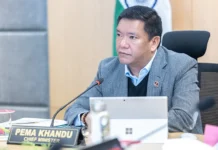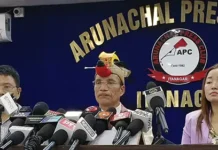RONO HILLS, 15 Nov: A two-day international e-conference themed ‘Media education and National Education Policy (NEP)-2020: A Trans-disciplinary global perspective’ began at Rajiv Gandhi University (RGU) here on Monday.
The e-conference is being organized by RGU’s mass communication department in collaboration with various other universities across the country.
RGU’s mass communication department’s Information Technology Dean Prof Kh Kabi informed that, “as India recently marked the 100 years of media education, it is crucial to understand the evolution of media and its importance in the NEP. The two day e-conference will be crucial in terms of media education.”
Prof Vinod Pavarala from the University of Hyderabad’s mass communication department said, “Media and communication education has gained popularity in India in recent years. In 50-60 years, the field has grown rapidly. Hence, it is important to understand the funding process for media education.”
He claimed that “conventional journalism has lost its value, and therefore, the University of Hyderabad is focusing more on media and technical education.”
“In terms of media education, we are in a very critical situation after 1975. It is important to equip our students with all the knowledge related to politics, economics, etc. The NEP also focuses on language and the need for global citizen education and mandatory internship. Internships programmes have to be broadened and not just limited to media institutions but also in NGOs and other non-media institutions,” Prof Pavarala said.
RGU Vice Chancellor Prof Saket Kushwaha stressed on “the character of humankind to constantly learn” and said that “this has given mankind the edge on everything.”
The VC suggested “two diplomas for every teacher, one in education and another in mass communication, for better understanding in terms of delivering lectures and capacity building.”
RGU Pro-VC Prof Amitava Mitra spoke on how the NEP is going to transform the entire Indian education system and why the need for media education has to be addressed.
Manipur University Vice Chancellor Prof N Lokendra Singh said that “the announcement of the NEP shall incur drastic changes in the education system.
“In school education, the policy focuses on overhauling and reducing the burden of examinations. The NEP focuses on universities in India to become multidisciplinary. In a country like ours, a vibrant education system is required,” Prof Singh said.
Tripura University Vice Chancellor Prof Ganga Prasad stressed on the importance of imparting valuable media education.
Dr Nawaz Khan informed that the e-conference aims to “provide a platform to the scholars to learn as it is the right time to understand media education and the National Education Policy.”
Eighteen speakers, including one each from Bangladesh and Nepal, will be speaking in the two-day international e-conference. More than 47 papers will be presented.


